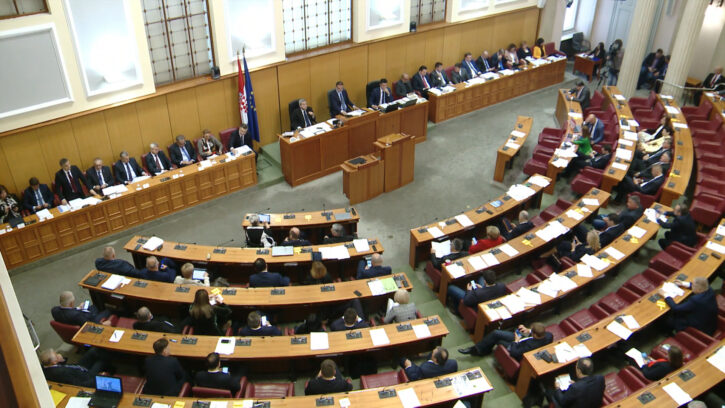
A commemoration on the occasion of the 24th anniversary of the 1995 Srebrenica genocide, when more than 8,000 Bosniak men and boys were killed by Bosnian Serb forces, was held at the Croatian parliament and a message was sent out that a crime of that nature must never occur again.
The commemoration, during which the names were read out of 33 victims whose remains will be laid to rest on July 11, was organised by the Association of Bosniak Homeland War Veterans and the member of parliament who represents a group of minorities, including the Bosniaks, Ermina Lekaj Prljaskaj.
Deputy Parliament Speaker Zeljko Reiner said that commemorations for the Srebrenica victims reopened old wounds.
Twenty-four years after the atrocity, its dimensions are still being uncovered because in 1995 thousands of innocent people were killed in the most massive crime and genocide after World War II. They remain in our collective memory of the brutality of individuals who demonstrated their inhumanity. The truth is important for the sake of the victims and their families because any denial hides the seed of future wars and crimes, said Reiner.
Only the truth and admission of responsibility for crimes pave the way to a catharsis, Reiner said.
Hamdija Malic of the Association of Bosniak Homeland War Veterans said that the Srebrenica tragedy occurred because of the aggressive and criminal policy of Slobodan Milosevic, who, he said, could have prevented it with a single phone call to criminal Ratko Mladic yet he did not do so.
Killing more than 8,000 people in several days is an unprecedented crime after World War II, he said, accusing international politicians in power at the time of failing to do anything to prevent the atrocity despite having witnessed the tragedy of the Croatian town of Vukovar.
He said that it was tragic that the Serb Orthodox Church encouraged Great Serbian paramilitary forces that killed, raped and expelled non-Serbs and burned their homes.
We thank Croats and the Croatian Parliament for having a big heart and for recognising the participation of 25,000 Bosniaks in the Homeland War, of whom 1,100 were killed, Malic said.
The commemoration in the parliament was also addressed by Lekaj Prljaskaj, an envoy for the Croatian president, Mirjana Hrga, and Zagreb Mayor Milan Bandic.
Nermin Mujkanovic, who was a child at the time and survived the Srebrenica genocide but lost two older brothers in it, spoke at the commemoration about those events.




